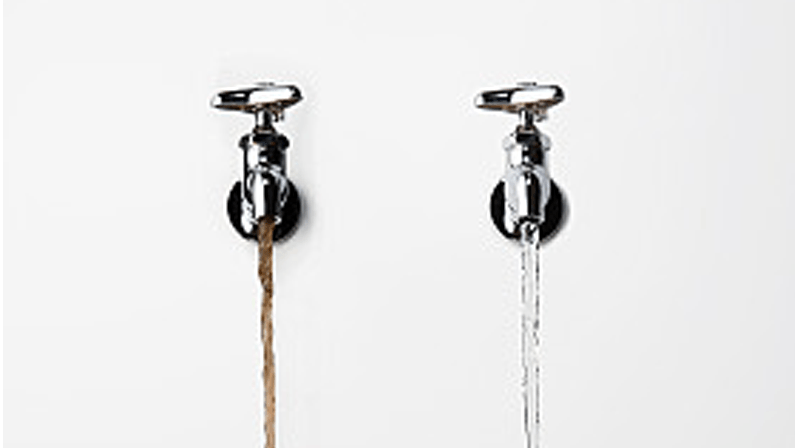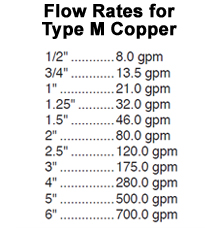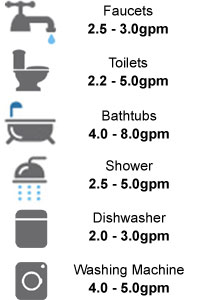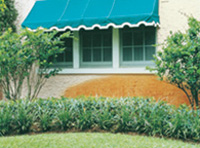Flow Rates – The Achilles Heel of Any Water System

“Flow Rate” is a critical specification that is often overlooked when people are looking for a new water system.
When you ignore this spec, it’s no different than ignoring the Law of Gravity. The results will hurt!
This article will explain what flow rates are, and how to determine the needs of your home or business.
So what is a Flow Rate Anyway?
If a water heater is too small, you run out of hot water. If a water softener is too small, you may not have enough gallons of soft water. These examples involve a lack of “capacity”.
What most people don’t understand is that it takes time for a water treatment system to work. A chemical reaction needs to take place so water softeners can remove hardness. Water filters need even more time to remove contaminants.
The time it takes for these processes to happen is what’s called the system’s “Flow Rate”.
The combination of components and overall system size will determine how quickly, or at what Flow Rate, water can be processed.
Ignore a system’s Flow Rate, and you can run out of clean water in a matter of minutes.
How Much Water Can You Actually Get?

Flow Rates are measured in gallons per minute (gpm).
For our purposes, we will talk about the amount of water that you can get through a pipe at a velocity of 8 feet per second (a standard velocity used to engineer a plumbing system).
Plumbing diameter will limit the flow rate you can get – the larger the pipe, the more water you can get. A home with 1″ plumbing can use substantially more water than a home with 3/4″ plumbing.
How Much Water do You Need?
Residential water use can range from as little as 4gpm for small homes, up to 80gpm to irrigate a large estate. Commercial and industrial flow rates commonly exceed 100gpm.
So let’s figure out what you actually need:
1. Think about the maximum number of fixtures and appliances you might operate at the same time.
2. Look at the chart to see how many gallons per minute each device requires.
3. Add up the flow rates for all the devices you selected.
You just figured out the PEAK FLOW RATE that you need.
Now, think about your continual water use, or water use that may run for more than 10 minutes. Add up the fixtures again, and you just calculated your SERVICE FLOW RATE.
You now have two critical pieces of information you can use to pick your next water system.
Example:
Let’s say you wanted to have a luxurious walk-in shower with (1) overhead rain shower head that used 3gpm, and (8) body sprays that used 2gpm each. This shower would require a 19gpm mix of hot and cold, and would require a ¾” cold feed, and a ¾” hot water feed.
Irrigation Flow Rate Requirements
Iron staining can be a major frustration for homes and businesses on private wells. Driveways, walking paths, landscaping, and exteriors, are often victims of huge waves of orange and brown staining. Porous surfaces like stone and stucco don’t even stand a chance!
Iron Filtration Systems can be designed to eliminate this troublesome staining and keep iron sludge from building up inside the sprinkler lines as well.
When designing an Iron Filter system for irrigation, start by inspecting your sprinkler heads. Many residential sprinkler heads operate at 2-2.5gpm. It’s not a bad idea to contact your sprinkler head manufacturer to get an exact figure. You will also need to count how many sprinkler heads that run per zone.
Example:
Let’s say you have 7 heads per zone, each operating at 2gpm. You would require 14gpm and should have at least 1” plumbing for your irrigation system.
If your irrigation takes place at night, then this is the figure you need to design a filter system. If you water during the day, you will also have to add in your domestic water use. Your plumbing and your Iron Filter system will have to handle this increased flow rate requirement.
Summary
Now that you have a better feel for your flow rate requirements, you should be able to avoid the major disappointment that comes from an improperly sized system!
Since 1978, Premier Water has designed and installed a wide range of water softeners and filters for both residential and commercial applications. We can be reached at (952) 479-4553, and are always excited to help you plan your next water treatment system.



Great info, thanks for sharing! I will definitely be looking closer at the flow rate on my water filters next time I’m replacing them.